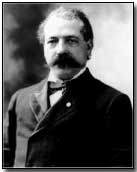Who's Who - Samuel Gompers
 Samuel Gompers (1850-1924) was a
prominent U.S. trade union leader in the years prior to and during World War
One, although he saw his influence diminish from 1919.
Samuel Gompers (1850-1924) was a
prominent U.S. trade union leader in the years prior to and during World War
One, although he saw his influence diminish from 1919.
Gompers was born in London on 27 January 1850 but emigrated to New York in 1863, becoming a naturalised citizen in 1872.
As president of the American Federation of Labor from its inception in 1888 Gompers was a moderate trade unionist, believing that employee relations could best be encouraged through an effective dialogue between management and workers.
As such the AFL was, so far as could be managed, a non-political organisation and was - unlike other contemporary bodies, such as the Industrial Workers of the World - resolutely non-socialist. He nevertheless campaigned tirelessly for basic trade union rights - to picket, and to organise boycotts and strikes.
Such views inevitably led the AFL to be associated in the minds of many with the Democratic Party - and indeed the AFL publicly supported the 1908 Democratic presidential candidate, William Jennings Bryan, on account of his pro-union policies.
Although a committed pacifist he recognised the advantageous possibilities open to U.S. labour as a consequence of the declaration of war in Europe in August 1914. His personal views notwithstanding, he was nevertheless keen that his union's membership - comprised of some 2.4 million predominantly white skilled workers - should benefit from the boom in orders placed by the belligerent powers in Europe.
The U.S. did not enter the war until April 1917; however Gompers was one of many campaigners encouraging a state of war readiness in 1916. Accordingly he was appointed as an advisor to the Council of National Defense in October 1916.
Gompers worked closely with U.S. propagandist George Creel to encourage domestic support for the war effort once President Wilson formally declared hostilities in April 1917.
His great fear however was that a U.S. declaration of war would lead to a marked political swing to the right, with its consequent blow to trade union influence. Such was the case: once war was underway public sentiment proved susceptible to business claims that trade unions acted against U.S. wartime interests and were inclined to socialism - in short, were unpatriotic.
Thus although the economic effects of war operated in the interests of his union's members, union leaders found their influence notably weakened after the war had come to a close, particularly with Wilson's decline in health and the subsequent election of a Republican president.
Gompers died on 13 December 1924 in San Antonio, Texas, at the age of 74, having retained the presidency of the AFL until his death.
Click here to hear a speech by Samuel Gompers encouraging co-operation with the U.S. war effort. Click here to read Gompers' views on the U.S. policy of conscription.
An Adrian Helmet was a French regulation helmet named after its designer.
- Did you know?
